- Home
- Sarah Zettel
Dangerous Deceptions Page 3
Dangerous Deceptions Read online
Page 3
In answer, Matthew took up my hand and pressed my knuckles to his mouth. He also moved slowly, allowing us both to savor the gesture. All the while, he bestowed upon me a lingering, welcome, and very warm glance. As little patience as I have for the exaggerations of our more long-winded romantic poets, I can say with complete honesty that lightning shot through me. Matthew knew it too, and he grinned. I grinned in return, not like the sophisticated maid of honor, but like simple, besotted Peggy Fitzroy.
“That’s better.” Matthew lowered my hand, but did not bother to release his other arm from around my waist. “When you walked in, you looked like there’d been a death.”
I truly wished he had not said that, because it brought all my attendant fears crowding back.
“Matthew, this is going to be a disaster.”
“It’s going to be fine, Peggy Mostly.” I kept meaning to inform Matthew that he could not get away with attaching this most undignified cant name to an important person such as myself, but somehow the opportunity never arose. “Even you can play the dutiful for the length of one dinner. When it’s over, you’ll release your relations into the drawing room, and they’ll be so busy making their bows, they won’t have time to pester you.”
“No, you don’t understand, it’s more than that. It’s—” I froze, the whole tangle of words in my mouth stopped up by a sudden, terrible realization.
I could not tell Matthew what had just happened between myself and Sebastian.
I had shared with Matthew many details about my life. He had even assisted with my spying. But I had somehow entirely failed to mention my status as a betrothed woman. I’m certain there were many excellent reasons for this omission. Given time, I might even have been able to sort through the fear and embarrassment tumbling down upon me to remember what they were.
But I did not have time. Matthew had taken full note of my confusion. He cocked his head in what I’d come to think of as his artistic way—the one that allowed him to break down whatever he saw into its component portions of light and shadow. “Is something wrong?”
I rallied. I could not reveal the existence of Sebastian Sandford with only a few minutes and limited privacy. Explaining the existence of a fiancé to one’s paramour required seclusion, time, and a supply of strong drink. Possibly smelling salts as well.
“It’s just so strange, meeting my relatives as, well, equals,” I told him, which was true, just not the truth I’d almost let slip. “I’m afraid the moment they walk in I’ll turn back into the little orphan I used to be.”
Matthew’s response to this pretty speech was to frown and step back. “Yes, and there’s something more. What is it?”
Becoming infatuated with a keen-eyed artist, it seemed, had distinct drawbacks, especially when one needed to practice some small social deception.
“I can’t tell you now.” I shot a glance at the waiting men. Both Matthew and I knew they’d talk about anything they heard. I made a note to myself that I must take time later to feel guilty about being glad of their attentive presence. “Matthew, thank you for being here, but you’d best go.”
Matthew hesitated, and I watched him try to keep the suspicion from his features. My heart sank. I had deceived Matthew before. I prayed that he had forgiven me, but neither of us had had anything like enough time to forget.
“Peggy, are you in trouble again? Is it . . . Tinderflint business?”
“No. Not this time.” We both spoke seriously. Mr. Tinderflint’s business was the spying, as Matthew knew full well. “I will tell you everything as soon as I can.” And as soon as I can work out how, I added to myself. As it was, I was silently thanking my stars that protocol did not allow me to invite Matthew to this family dinner. I had no idea which way the conversation would turn. It was unacceptable that Matthew should learn about my betrothal casually between dinner courses.
“All right.” Matthew kissed my hand again. “A promise against later, when you’re wearing your own face.”
He took his leave then, and one of the servers closed the door behind him. I faced a room grown several degrees colder by Matthew’s absence, and far more lonely.
I had believed this dinner would allow me to show both success and contrition to Uncle Pierpont. But with Sebastian’s reappearance, everything became much more serious. If I hoped to retain my freedom, I must show Uncle Pierpont that I could be useful to him. I must make it clear that I was not just another hanger-on at court. As maid of honor, I was sought out and cultivated by the wealthy and powerful because of my proximity to our future sovereign. Removing me into a marriage would be a waste of resources.
Tonight, I must look up into the eyes of my flint-hearted uncle and make him change his mind.
FOUR
IN WHICH OUR HEROINE GIVES HER FIRST PARTY AND DISCOVERS THAT NOT ALL THE CIRCUMSTANCES OF HER LIFE HAVE CHANGED.
Unfortunately, the small salon offered very few options to soothe a fluttering of nerves that had ambitions to become a full-fledged attack. I tried to distract myself by inspecting all aspects of both table and sideboard. The two serving youths in their green coats watched my every movement from their posts. I pretended to ignore them. There was a protocol between the servants and the served for even a small dinner. As this was my first chance to play hostess at my own table, I was determined to get it right. I will say that their eyes lingered a bit more on the leather purse I carried than on any other detail of the room.
I stopped in front of the servants. The taller of the two had already begun to turn stout, and his face had been badly pockmarked, which left him with a sinister appearance, but there was intelligence in his brown eyes.
“And your name is?” I addressed the stout, scarred youth as the senior of the pair.
“Norris, Miss Fitzroy, and Cavey.” Stout Norris jerked his spotty chin toward his companion—the smaller, stick-thin youth at the other side, who looked as if he’d as soon bolt as stand and serve. Perspiration trickled down one cheek.
“This is an important gathering,” I told Norris, emphasizing my point by dropping a pair of half-crowns into his hand. “It is vital that everything go smoothly.”
“Yes, miss. Of course.” Norris eyed Cavey and jingled his hand significantly a moment before pocketing the coins. Some of the frightened-rabbit air dispersed from about Cavey’s slender person.
“Thank you, and—” I was prevented from finishing that sentence by the door slamming open.
“Peggy!”
I had meant to bestow upon my uncle and aunt my most elegant and dignified curtsy, the one I reserved for the drawing room when everyone was watching. Instead, as Libby pushed open the door, my cousin Olivia exploded into the room, shoved a set of boxes into Libby’s hands, and ran forward with a turn of speed that would have impressed even Mary Bellenden. For the second time that evening, I found myself enfolded in a welcome embrace.
“Olivia!” I forgot everything else and hugged her back as hard as I was able.
From the day I arrived at my uncle’s house, Olivia had been my most constant companion. Perhaps it would be more accurate to say I was her companion, since she was the star of any social gathering we went to. This was in part because she looked very much the beauteous English rose, with gentle blue eyes and a blooming, creamy complexion that needed only a hint of powder and a single patch to become the envy of half the women at court. She threw off her midnight blue velvet cloak to reveal a gown of ice blue and ivory satin trimmed with silver lace that she wore with an attitude of perfect comfort.
If I had not been the recipient of Olivia’s unfailing friendship, I could have dined on my envy. Fortunately, Olivia also had a mind and imagination of diamond clarity and a nerve that could tip from brave to reckless at the least provocation. If our positions had been reversed, she would have taken to this business of court and spying like a duck to water. As it was, she hoarded up descriptions of the adventures we had already shared and stored them in her journals. One day, she swore, she would cobble
them all into a play or a dramatic serial for the papers.
If my uncle ever got wind of that plan, he would die of apoplexy.
“Peggy, darling!” My aunt Pierpont glided past her husband to take both my hands. Aunt Pierpont and I had always gotten along well. She was a small, plump housewife now, but she had been a beauty in her youth, and she still remembered how to wear court regalia well. But not even her layers of carefully applied cosmetics could entirely erase the telltale nervousness that was her primary characteristic.
“How good it is to see you again,” she bubbled. “And looking so well. I adore your hair in that fashion. It suits you exactly!” Aunt Pierpont still wore a fontange with a tall lace veil to accompany her round gown of figured black velvet and ecru satin. I suspected this styling would change after tonight. “And what a lovely dress! Is our Peggy not looking well, husband?”
My uncle did not glide forward, much less bolt. He stalked, and as he did, he looked down at me from under lowered eyelids. Uncle Pierpont was a tall, thin stork of a man with narrow, calculating eyes. His nose was as pointed as any pen, and his soul matched the sharp severity of his person. His sole concession to palace formality was that he had forsaken his short-queue wig for a great, curling full-bottomed creation with two peaks above his brow that bore an unfortunate resemblance to a bull’s horns. Otherwise, he wore the black velvet and white silk that I was used to seeing on him. Even the bows on his shoes were black. All in all, he looked like a demon clergyman with severe indigestion.
I found myself deeply grateful for the past months of practice in deportment and keeping my countenance. I met Uncle Pierpont’s narrowed eyes briefly, then sank into a curtsy that, if it did not rise to stateliness, was at least steady and respectful. In acknowledgment of this filial gesture, my uncle grunted and continued his stork-stalking past me to the sideboard, where he set about examining the tags on the wine bottles.
I straightened up and felt my gaze fasten on a spot directly between his sharp shoulder blades that I knew to be a particularly vulnerable point of the human body. It was fortunate for all of us that Olivia recognized the danger signs.
“Come see what I’ve brought you.” Olivia threaded her arm through mine and steered me toward Libby. My maid still held the boxes she’d been so unceremoniously given. She also eyed me from over their tops in a manner both impatient and impudent. My cousin did not seem to notice, however, and took up the entire pile so she could open them and lay out the contents on the table.
“Oh, Olivia!” She had brought me my mother’s sandalwood fan, and her sapphire necklace. These were my only legacy from her, and I had not been sure whether I’d ever see them again. Best of all, however, was when Olivia opened the largest box to display Flossie. Flossie was a porcelain doll my cousin had given me. Aside from Olivia, I’d always regarded Flossie as my one true companion. Although I was of course far too old for dolls, the sight of her affected me so, I had to touch the corner of my eye to stop a tear from streaking my cosmetics.
I closed the boxes carefully. “Libby, take these back to the room, please. Thank you, Olivia.” I embraced her again. This time I whispered in her ear. “When the time comes, remember to ask about arrangements for Guinevere’s confinement.” Before Olivia could stare blankly at me for too long, I turned to my aunt. “And thank you, Aunt, as well, for coming. It is so good to see you again.”
Uncle Pierpont had evidently finished his examination of the bottles.
“This one,” he grunted to Norris, indicating his choice. “And then this.” He turned to me. “I thought we were here to dine.”
I trust my reader will fully appreciate the heretofore unplumbed wellsprings of familial feeling and dedication to duty demonstrated by the fact that I here managed to confine my immediate reply to a charming smile. “Indeed we are. You may bring in the first course,” I told Norris. “Uncle, won’t you please sit here?” I indicated the chair at the foot of the table, the place of second rank. As this was my dinner in what was nominally my home, protocol and etiquette dictated that I sit at the table’s head, and there was nothing at all he could do about it.
Uncle Pierpont sat and gulped the wine that Norris poured. I hoped it was the chianti. It might have been vinegar for all that it relaxed his expression. I was not surprised. Indeed everything about him, from his beady-eyed glower to his frozen indifference to all changes in my status, was exactly as I had expected. This was, however, the one contingency I felt entirely prepared for. I called forth my training as maid of honor, fixed on my most winning smile, and started talking.
I talked with Olivia about our mutual acquaintances. I asked who she had seen recently and how they did. I talked with Aunt Pierpont about fashion and asked about her annual summer trip to Bath. I spooned out generous helpings of the tamer court gossip so she could share it with the ladies of her set.
Both Aunt Pierpont and Olivia understood exactly what I was doing, and they were more than ready to keep up their end of the conversation. I heard that my friend Kitty Shaw had recently gotten engaged to Raphael Swinton and was hoping I’d be at the wedding. Lady Clarenda Newbank—another acquaintance, although most definitely not a friend—had apparently been discommoded by the marriage, as she’d been angling for Mr. Swinton herself. I asked Olivia to convey to Lady Clarenda the depth of my sympathies and tell Kitty my direction for the invitation. She could also deliver my promise to invite Kitty and her fiancé to court for a visit as soon as possible. I heard that Mrs. Quint had decided to remain in Bath, probably for good, and taken all her nieces with her. I privately thought those nieces must be the reason for the removal. I did not, however, mention that I’d seen the youngest at a recent masque, without her sisters or any male relative I knew, but most definitely not alone. Instead, I speculated on the latest rumors that the ladies of Versailles had moved on from overturning all accepted hair stylings to adopting a flatter, wider style of skirt hoop. This, naturally, threatened to send as great a shock through our world as the removal of the fontange. The idea of having to acquire a whole new set of fashionable cages for underneath my gowns filled me with horror, but it appeared to delight my aunt.
This conversation and more like it managed to occupy us through the first two courses, with their sole in oyster sauce, the roasted partridges, the ham, the joint of beef, the spinach and ragout of root vegetables, and the savory tarts. As the third course of venison, jugged hares, macaroni in mushroom sauce, and crème Française arrived, I casually turned my conversation to those matters that I had selected especially for my uncle’s ears.
I made sure to detail my daily routine, as it brought me into contact with Their Royal Highnesses. I regaled them with the very funny thing the First Lord of the Treasury said, and the excellent question Mr. Robert Walpole had posed, and how I had danced with the Foreign Secretary for the Southern Department. I did not omit to mention how gracious the king himself had been when I first arrived at court, although I glossed over some of the finer points, since he had thought I was Lady Francesca at the time.
My uncle glared quietly through the first course.
He glowered ominously through the second.
By the third, he was silently seething.
It was when the dessert had been achieved and I held out the dish of sugared almonds to invite him to help himself that his hand crashed down on the table.
“Enough! I did not come here to watch you bask in the spoils of your whoring!”
I held my face quite still. I set the almonds down. “Well, then, tell me, Uncle Pierpont. Why did you come here?”
Uncle Pierpont’s eyes glittered in anger and challenge. I met his gaze without fear. Oh, I was reckless. I was doomed. I was throwing away everything I had gained. I did not for a moment forget that I needed to garner Uncle Pierpont’s goodwill, but I would not, I could not, back down. Not to this man, and not ever again.
Then, slowly, incredibly, my uncle put a bridle on his temper. He lowered his shoulders and drew his head b
ack. It was something of the effect of a snapping turtle drawing back into its shell. He picked up the wine at his elbow and drained the glass in a single gulp.
“I came,” he said slowly, “for the same reason I took you into my house in the first place. Because your aunt insisted.”
“That is not entirely fair, you know, husband,” said Aunt Pierpont quickly. “You did say you wished to know how Peggy did. You said you were concerned.”
“And exactly when, madame, did you hear me say this?” Uncle Pierpont’s voice and face were equally icy as he spoke. That cold had its intended effect and set my aunt trembling.
“I can’t remember exactly. I—”
“Then you had best say no more about it.”
At this, Aunt Pierpont dropped her gaze and began to knot her fingers into her napkin. If I had not already disliked my uncle to the extreme of my ability, that would have done it. I had almost forgotten how infuriating it was to see him so ruthlessly put down my harmless aunt.
This was, may I add, a feat he had never come close to managing with Olivia. “Father, what does staying angry bring you, or any of us?” my cousin inquired. “Having Peggy in favor at court is a stroke of tremendous fortune for the whole family. Any man in the city would envy you.”
Before he could answer this, I rallied my wits. “Sir, I recognize that I am indebted to you for the years of my upbringing.” The words tasted sour in my mouth, but this was the strongest card I had to play. I would not waste it by appearing reluctant. “It is my hope that I will be able to use my post at court to pay you back, at least in part. You are a clear-eyed and practical man and always have been.” The most vital aspect of the flatterer’s art is to know how to compliment each person in his own special way. My uncle had always been proud of his hard head. “I am sure you will agree that there are advantages to be gained for your banking house and its business.”

 Laurel
Laurel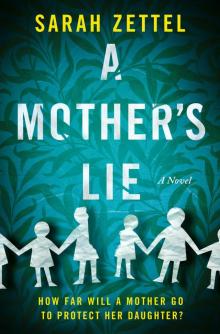 A Mother's Lie
A Mother's Lie Playing God
Playing God Dust girl
Dust girl Sword of the Deceiver
Sword of the Deceiver Let Them Eat Stake: A Vampire Chef Novel
Let Them Eat Stake: A Vampire Chef Novel Dust Girl: The American Fairy Trilogy Book 1
Dust Girl: The American Fairy Trilogy Book 1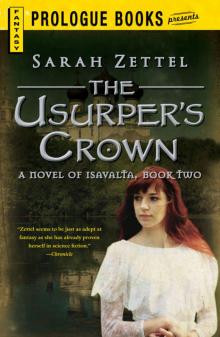 The Usurper's Crown
The Usurper's Crown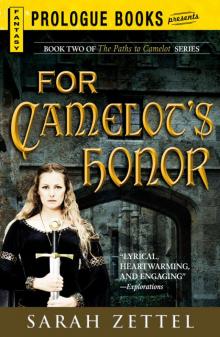 For Camelot's Honor
For Camelot's Honor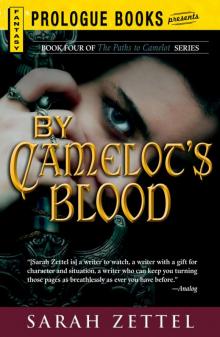 Camelot's Blood
Camelot's Blood Kingdom of Cages
Kingdom of Cages Fool's War
Fool's War Golden Girl
Golden Girl A Sorcerer’s Treason
A Sorcerer’s Treason The Firebird's Vengeance
The Firebird's Vengeance A Taste of the Nightlife
A Taste of the Nightlife Assassin's Masque (Palace of Spies Book 3)
Assassin's Masque (Palace of Spies Book 3) Reclamation
Reclamation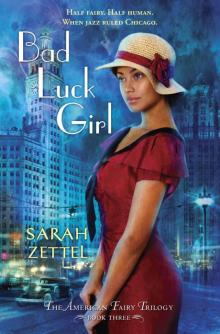 Bad Luck Girl
Bad Luck Girl Under Camelot's Banner
Under Camelot's Banner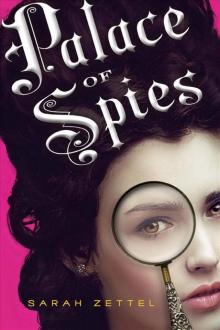 Palace of Spies
Palace of Spies Dangerous Deceptions
Dangerous Deceptions Quiet Invasion
Quiet Invasion In Camelot’s Shadow: Book One of The Paths to Camelot Series (Prologue Fantasy)
In Camelot’s Shadow: Book One of The Paths to Camelot Series (Prologue Fantasy)